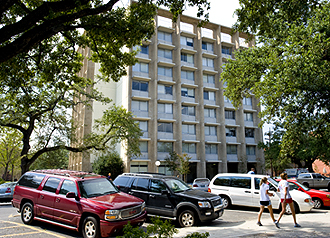Shelter in a Storm
While Tulane implemented a successful evacuation of students last week for Hurricane Gustav, it also has a plan to provide students on-campus shelter in their own residence halls during storms that pose no significant threat to New Orleans. “If we get a glancing blow from Hurricane Ike, this is the option we're looking at,” says Greg Southworth, the university's emergency response director.

Students living in residence halls may stay on campus when storms present little threat to the city. (Photo by Paula Burch-Celentano)
The “shelter-in-place” alternative of Tulane's hurricane preparedness plan provides for tropical storms or minimal hurricanes.
The decision to call for “shelter-in-place” will be made 60 hours before tropical storm winds reach the coast of Louisiana, says Southworth.
Students will be advised of the time that they need to be in their residence hall rooms, if necessary, for the lockdown. Staff members from student affairs and public safety will remain with students in the residence halls to provide supervision during the storm.
In addition, says Southworth, each residence hall will have a nurse or an emergency medical technician in-house. Meals for students and essential staff will be served in Bruff Commons.
“After the storm passes over and we check the campus, then we will release the students,” says Southworth.
Tulane President Scott Cowen and university leaders would maintain a round-the-clock vigil at the president's residence, adjacent to campus at No. 2. Audubon. Command posts located on the uptown and downtown campuses as well as the Tulane National Primate Research Center will report to the president.
If the emergency plan is activated, students would not be required to remain on campus, says Southworth.
He emphasizes that faculty and staff will not be allowed to shelter at the university.
The shelter-in-place option has been implemented twice in the last decade in 1998 during Hurricane Georges and in 2002 during Hurricane Isidore. “The reason it hasn't been done since Hurricane Katrina (2005) is that we haven't had a minimal storm since then, and also the condition of the levees. Now that the levees have been restored to pre-Katrina strength, we can exercise this option.”
The Tulane Emergency Operations Group, led by Cowen, is meeting several times daily to monitor Hurricane Ike, just as it did for Hurricane Gustav.
Any announcement to close the university will come from Cowen. In addition to the emergency website, Tulane has a system in place for rapid dissemination of information by voice and text messages. The latest emergency information also is available by calling the Tulane AlertLine at 504-862-8080 or 877-862-8080.
